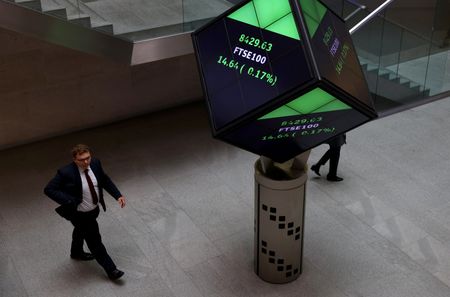By Maria Martinez
BERLIN (Reuters) -German investor morale fell more than expected in August, the ZEW economic research institute said on Tuesday, citing widespread disappointment with the European Union-U.S. trade deal and Germany’s sluggish second-quarter economic performance.
The economic sentiment index fell to 34.7 points from 52.7 points in July. Analysts polled by Reuters had predicted a reading of 39.8 points.
“Financial market experts are disappointed by the announced EU–U.S. trade deal,” said ZEW President Achim Wambach, who noted that the monthly decline was also due to Germany’s poor economic performance in the second quarter.
The outlook had worsened in particular for the chemical and pharmaceutical industries, Wambach said, although the mechanical engineering and metal sectors, as well as the automotive industry, were also severely affected.
“It was not a good deal for Europe,” said DekaBank economist Andreas Scheuerle, arguing that there would still be a big increase in tariffs.
The EU’s trade deal with President Donald Trump in July was greeted with a mix of relief and anger, with tariffs set at 15% for most EU goods exported to the U.S. but negotiations are continuing for certain sectors, including steel and aluminium, which carry tariffs of 50%.
“Although the agreement in the tariff dispute between the EU and the U.S. has reduced perceived trade policy uncertainty, this will likely mean that further interest rate cuts by the European Central Bank will be off the table for now,” said Deutsche Bank economist Marc Schattenberg.
Germany’s economy contracted by 0.1% in the three months to June 30, as U.S. demand slowed following months of strong purchases in anticipation of tariffs.
“Companies are anxiously wondering how long the peace on the trade front will last,” said Elmar Voelker, economist at LBBW. “The economic environment is likely to remain difficult for the rest of the year.”
The survey’s assessment of the current economic situation also deteriorated significantly, with the indicator falling to minus 68.6 from minus 59.5 points the previous month.
“In the second half of the year, however, the German economy should pick up again, not least thanks to substantial government investment incentives,” Deutsche Bank’s Schattenberg said.
Germany’s parliament approved plans in March for a massive spending surge, throwing off decades of fiscal conservatism to revive economic growth and scale up military spending.
(Reporting by Maria Martinez; Additional reporting by Rene Wagner; Writing by Friederike Heine; Editing by Rachel More and Rachna Uppal)











